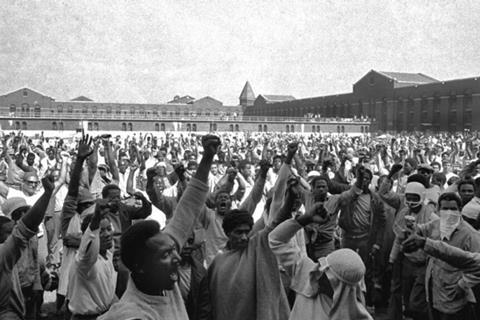Academy-award nominated documentary gives a voice to the silenced men of the Attica prison uprising of 1971

Dir. Stanley Nelson, Traci A. Curry. USA. 2021. 116 mins
It may be just over half a century since the prison uprising and its brutal aftermath unfolded in the maximum security prison in Attica, New York, but the issues raised by this detailed and at times harrowing documentary remain depressingly timely. Compiled from extensive archive footage and interviews with surviving inmates, the family of hostages, members of the ‘observation committee’ - which was called in to attempt to negotiate a peaceful solution - but, tellingly, no former guards or state troopers, the film is a forthright indictment of the institutional racism and human rights abuses in the American penal system at the time. It clearly and forcefully sets out the scope of cruelty that man can visit on his fellow man if he believes him to be somehow less than human. “Do any of you gentlemen have dogs?” asks one inmate during a highly charged encounter with the press. “You treat them better than we have been treated.”
The film is scrupulous about giving voices to men who, as prisoners, were denied them
Co-directed by multi-award-winning documentarian Stanley Nelson (Freedom Riders, The Black Panthers: Vanguard Of The Revolution) and Traci A. Curry, who produced Nelson’s previous project Boss: The Black Experience In Business, this is an exhaustive and emotive piece of filmmaking which is as damning in its appraisal of the US prison system as was Ava DuVernay’s O. It is not the first film to tackle the Attica uprising: others include a 1974 documentary by Cinda Firestone; and several dramatisations including a 1980 TV movie starring Morgan Freeman and a 1994 version by John Frankenheimer which starred Samuel L. Jackson (Against The Wall). But Attica, which premiered in Toronto, fifty years to the day since the midpoint of the five-day drama, and has been Oscar-nominated for Best Documentary, feels like the closest thing we have to a definitive account.
That is not to say that there are no question marks or omissions in this version of events. The interview subjects who are prepared to appear in the film tend to be those who could assume a more sympathetic hearing – the former inmates, the press who covered the event, the mediating team. Those on the other side of the prison bars – the guards and the state troopers – are represented by family members of men who were held as captives or injured in the initial riot. This means that there is nobody with first hand experience who can address the charges of the systematic dehumanising abuse which led to the powderkeg tensions in the prison in the first place. Interviewees recall “goon squad” beatings at night, Muslim prisoners forced to eat pork, racial abuse as well as petty humiliations like rationed toilet paper and unlaundered bed sheets and clothes.
Divided into five chapters coinciding with the days of the stand off, the picture builds a gradual and ominous momentum. Even for those who don’t know the details of the bloody conclusion to the uprising, the increasingly grim tone of the filmmaking, and the subdued score, give some indication that nothing good is coming. The wealth of archive coverage, together with the extensive interview material, means that there are moments when the pace flags and the same points are reiterated. But the film is scrupulous about giving voices to men who, as prisoners, were denied them. If there is an overlap in some of the observations and insights that the former inmates bring to the film, they tend to be points which bear repeating.
Production Companies: Showtime Documentary Films, Firelight Films, Topic Studios
International sales: Propagate Content International info@propagatecontent.com
Producers: Traci A. Curry, Stanley Nelson
Screenplay: Stanley Nelson
Editing: Aljernon Tunsil, Jaclyn Lee
Cinematography: Stefan Beaumont, Ryan Bronz, Kevin J. Burroughs, Ronan Killeen, Antonio Rossi, Bill Winters
Music: Tom Phillips
Featuring: Clarence B. Jones, Lawrence Akil Killebrew, George Che Nieves, Al Victory, John Johnson, Alhajji Sharif, Herman Schwartz, David Brosig, Arthur Harrison, Dee Quinn Miller, Maryann Valone, John Dunne, James Asbury, Ann Valone, Tad Crawford















![[L-R]: Amanda Villavieja, Laia Casanovas, Yasmina Praderas](https://d1nslcd7m2225b.cloudfront.net/Pictures/274x183/6/4/1/1471641_pxl_20251224_103354743_618426_crop.jpg)








